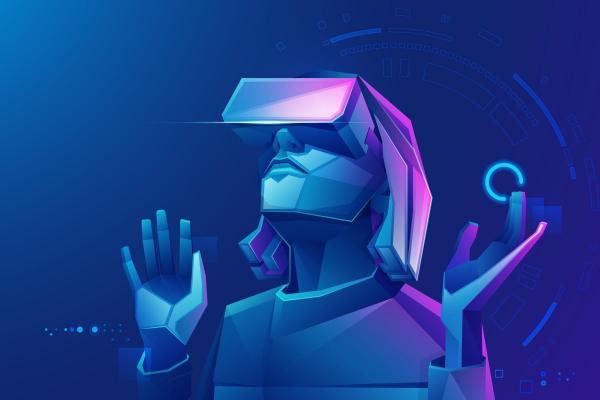

The Metaverse: What Is It, and Why Does It Matter?
The Metaverse came to the spotlight during the shift of everything online during the pandemic. Today, we'll explore a variety of experiences, environments and assets that all come together in the virtual space.
Quick note: there is more than one metaverse, and several companies are building their own metaverses. But to describe the concept of overlapping our digital and physical lives, we'll be using the term "the Metaverse".
What Is the Metaverse (Meta Verse)?
The Metaverse (also written as two words, Meta Verse) is a virtual representation of reality. It's an environment where people use their virtual selves to socialise, play games, visit concerts and even travel. Your 3D avatar can look just like you or be customised to whatever look you prefer to have in the Metaverse.
What is a Metaverse company? Broadly speaking, it is any company interested in the idea of the Metaverse. Some believe it must have a digital economy that's open, decentralised and democratic.
The Metaverse will largely be shaped by the following technologies:
- Virtual reality (VR) - To create a digital sense of presence through headsets
- Augmented reality (AR) - To support the synthesis of the physical and digital worlds
- Brain-computer interfaces (BCI) - To replace screens and physical hardware entirely.
The current state of these technologies limits the Metaverse's development and wide-scale adoption. Virtual reality headsets range in price from $300 to $3,500 as of 2022. As kinesthetic technology and communication become more commercially available, the hardware limitations should be lifted.
The Origins of the Metaverse
The Metaverse meaning was invented by the author Neal Stephenson in the 1992 novel Snow Crash. In the novel, people used digital avatars in an online world that they used as an escape from a dystopian reality.
After Stephenson coined the term, the concept was further explored by Ernest Cline in the 2011 novel Ready Player One. Similarly, in his book, the Metaverse characters were trying to break away from global warming and an energy crisis. The space called Oasis functioned as a virtual society where users could play multiplayer role-playing games.
What Are Some Examples of the Metaverse?
The Metaverse may find itself bound by technical barriers, but it is already partially implemented in today's platforms. We'll look at a few examples embodying the vision of the Metaverse to varying extents.
Epic Games - Fortnite
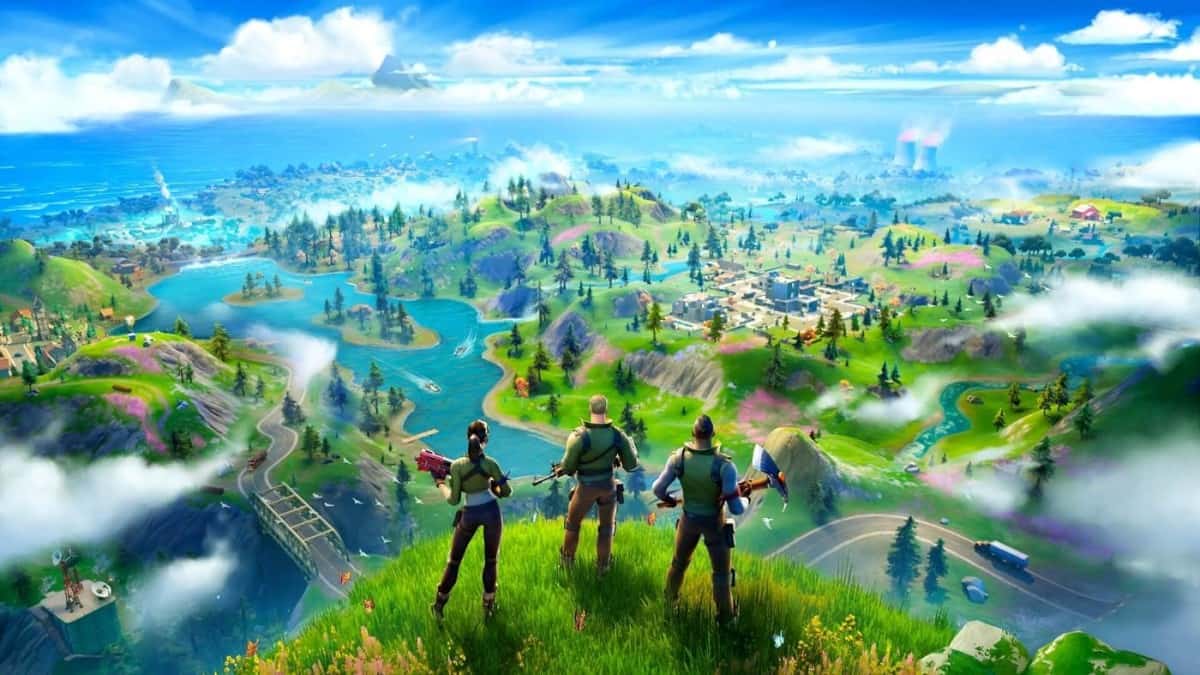
Fortnite hasn't reached full Metaverse status, but as a social network and cultural phenomenon, it gives Epic Games a massive advantage in the Metaverse race. It's the first virtual place where an avatar of Hopper from Stranger Things (approved by Netflix) can dance with an avatar of Rey Skywalker from Star Wars (approved by Disney).
In April 2021, Epic Games completed a $1 billion round of funding. In the announcement, the company's CEO and founder, Tim Sweeney, thanked everyone who had supported their vision for Epic and the Metaverse. He also talked about accelerating their work around building connected social experiences in Fortnite, Rocket League and Fall Guys. It is set to be a combination of social media, gaming and commerce powered by computing platforms, AR and VR.
At the end of 2021, the company filed a trademark for the "Epic Games Megaverse", which covers a wide range of goods and services.
Microsoft - Minecraft
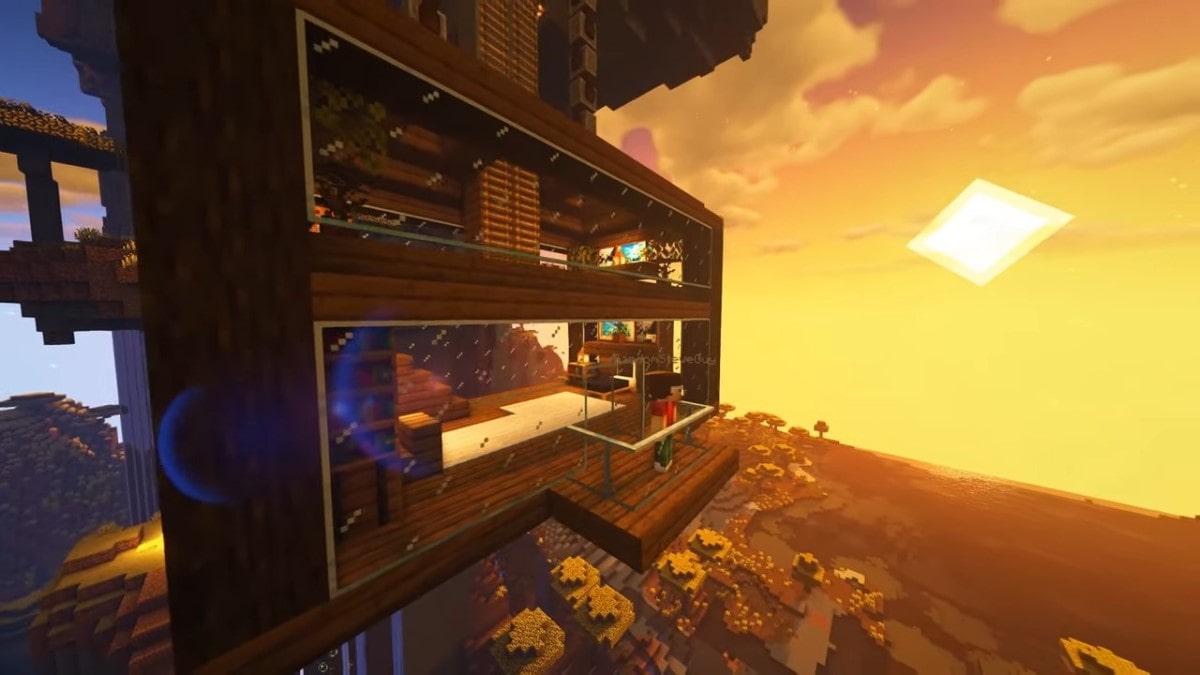
Minecraft has been transitioning into the Metaverse with VR and AR headsets. The initial introduction was through a wireless HoloLens headset. In a special version of Minecraft, users could issue voice commands and move the holographic game world around with hand gestures, which reportedly made for a great experience. At the time of the launch, the integration was six years in the making.
There was an attempt at an all-new augmented reality mobile game: Minecraft Earth. The game was meant to "bring Minecraft into the real world" but was shut down due to the restricted movement and lack of social mingling.
Microsoft acquired Activision Blizzard for $68.7 billion. The move will eventually become a building block for the Metaverse, which Blizzard will help with. CEO Satya Nadella said in an interview that it all came down to bringing real-world people, places and things to the Metaverse world.
World of Warcraft
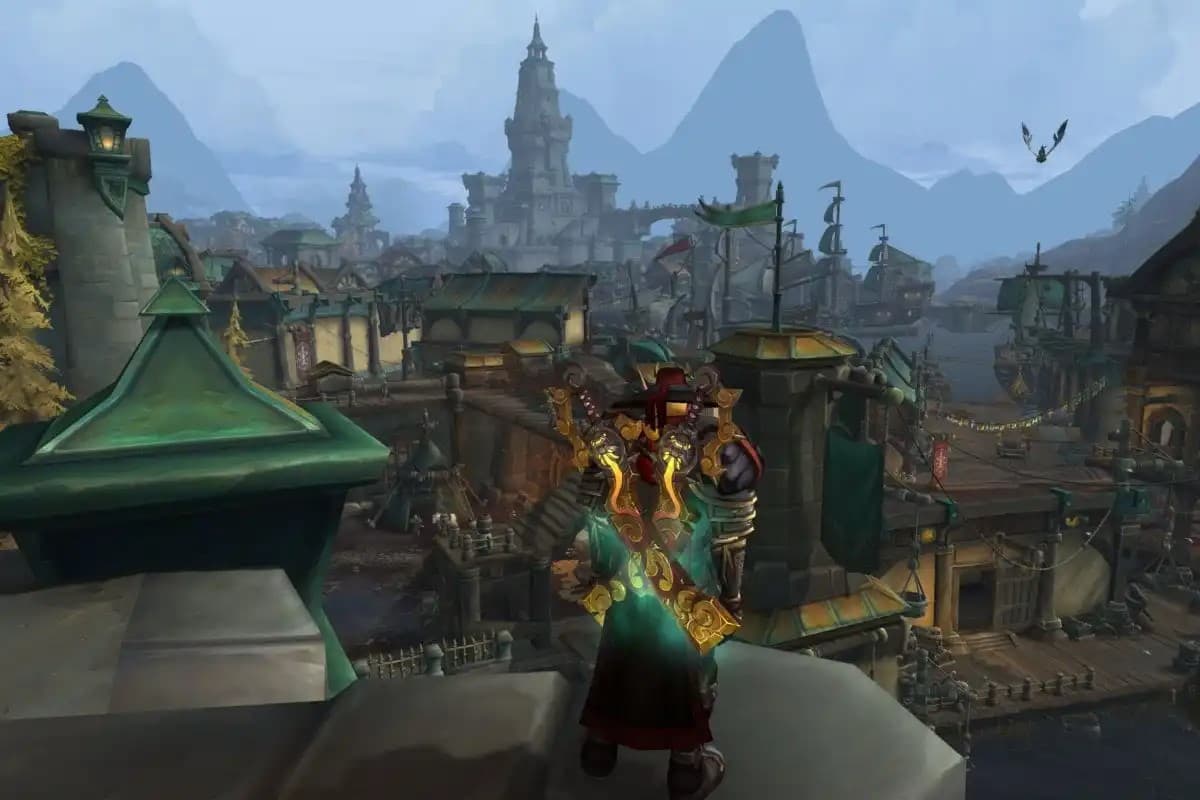
World of Warcraft (WoW) provided one of the earliest examples of the Metaverse in gaming. The game has avatars and the ability to mine resources, which can later be used to manufacture items and sell for gold.
World of Warcraft has always had features of the Metaverse in its DNA. It has an internal economy, i.e., a marketplace where players can buy in-game assets and exchange characters. Before cryptocurrencies were even invented, the game utilised PayPal, which people could use to convert digital assets into real money. A fully realised Metaverse system will simply organise it.
WoW has put more money and development into its Metaverse than any other one. It has cities, populations and more participants than any other virtual world of its kind. Arguably, there are more users who would like to visit this game, thanks to its longevity and visual appeal.
Growth Potential
By 2024, the Metaverse is expected to reach around $800 billion in revenue. This is more than a 60% increase from 2020 ($500 billion). The estimate is based on an analysis from Bloomberg and data from Newzoo, IDC, PWC, Statista and Two Circles. Out of that $800 billion, $400 billion is forecasted to be made by online game makers and gaming hardware, and the online game makers and gaming hardware will account for the rest.
The Metaverse will drive new opportunities and skills. B2C companies will need to conceptualise and build products that are consumed in the virtual world. This could be physical and digital merchandise, such as Nike shoes with a matching NFT. Or, if you host a party in the Metaverse, you could hire a real DJ to perform.
The point is that all these virtual opportunities are accompanied by new positions and job openings. The added benefit is that professionals that would otherwise be restricted by geography or cost can now participate. Another growing vector of opportunities will be in marketing. For perspective, by 2027, in-game advertising is expected to surpass $18 billion in spending.
The Metaverse opens up possibilities for B2B enterprises. The most important one is massive scaling at a low cost. A company can build a global meta-hub that can serve millions of customers (especially if the retailer doesn't want to fully switch to e-commerce). Or think about the ability to build a complex factory or an industrial space and test new tech to see how it would interact with real environments. Although, any application with real-life implications will need to have clear governance.
Who Can Build the Metaverse?
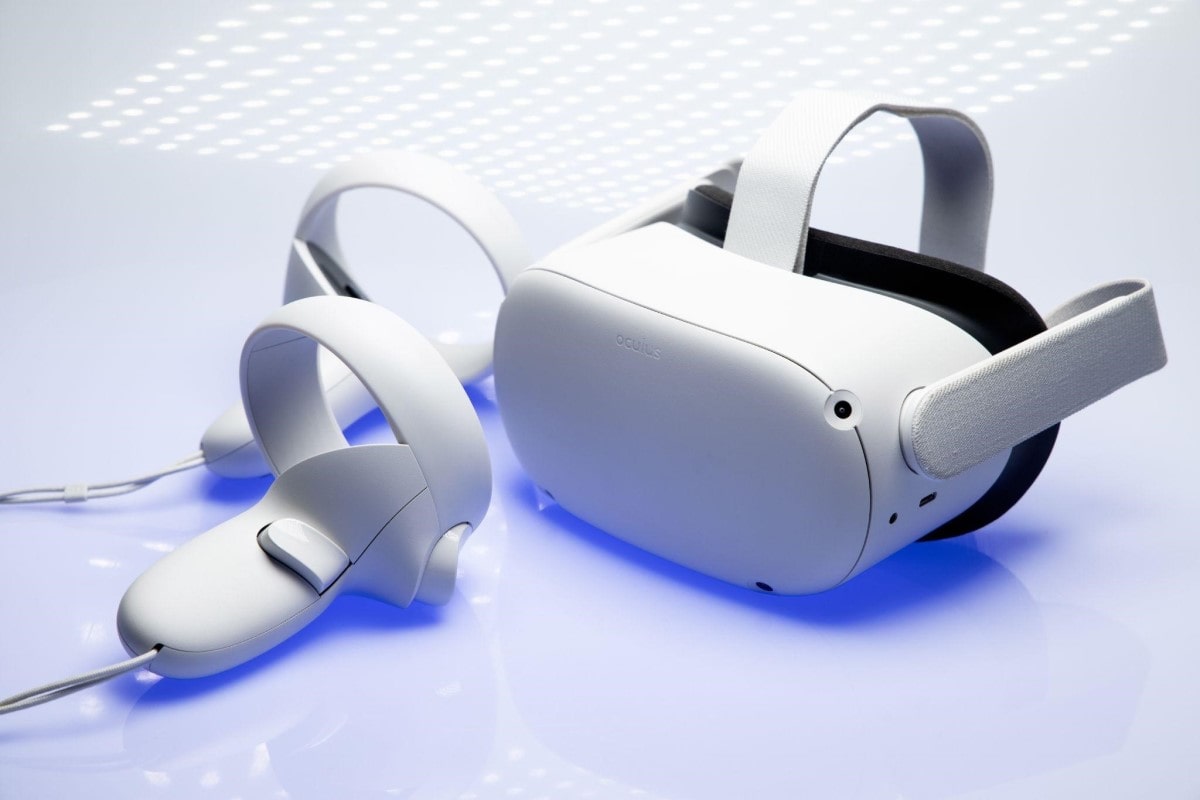
What will the Metaverse look like? That depends on who builds it. Some have already expressed interest; others are just perfect candidates for joining the craze.
The industry is eager to realign its investments and back those who can build the future. Let's see who that might be.
Meta (Facebook)
When Facebook bought Oculus, the virtual reality headset maker, in 2014, the company's long-term vision wasn't clear. Now that it's called Meta, CEO Mark Zuckerberg is moving from a social media platform to a Metaverse platform. This highly talked about transformation reflects the desire to build a next-generation Internet that relies on authentic and augmented realities. But why do we say it can build it?
Horizon Worlds, presented by Meta last year, featured various 3D gathering spaces, experiences and minigames. It demonstrated the vision for what the Metaverse might look like. But for now, it's a self-contained space, detached from the wider digital world.
The true Metaverse that Zuckerberg promises will integrate a host of new technologies far beyond the AR/VR ecosystem. The spokesperson Christopher Sgro said that the Metaverse couldn't be built alone. It will require an extensive collaboration with developers, creators, and experts, which is already in the works.
Roblox
Rather than investing in tech developments like AR and VR, Roblox is dedicated to building an immersive world using the currently available tech. In this regard, it has a similar approach to Epic Games' Fortnite. As a test drive, Roblox employees built a virtual version of their headquarters during quarantine. They incorporated everything down to whiteboards in conference rooms.
From a social interaction point of view, Roblox is already there. According to CEO Craig Donato, Roblox has a shared social fabric with the Metaverse, i.e., the social side. Users already have the ability to customise their avatars, build unique identities, navigate the social graph of whom users hang out with and make trades with an in-game currency Robux.
Donato mentioned that interoperability between metaverses and full immersion would take a while. Everyone is just building the technical stack. But before the Metaverse goes mainstream, it will require rules preventing it from being a Wild West.
Amazon
As an e-commerce giant, Amazon has already taken the first steps. Room Decorator, its newest AR shopping tool, offers users to visualise furniture and home décor in their own spaces. It allows them to place several products simultaneously and save AR snapshots to review later.
Other intentions for integrating the company's services in the Metaverse have just been hints. Amazon is already hiring for the Metaverse on its website without drawing much attention to the postings. The job listing for a Senior Product Manager, Technical (AWS Game Tech) mentions "the delivery of cloud-based Metaverse services" for its gaming tech division.
While there may be news from the gaming product department, Amazon has yet to bring the Metaverse seamless, engaging aspect to retail. The omnichannel experience between e-commerce, brick-and-mortar and social media is just what the market needs. The company already has an advanced tech stack and the total unification of data across every touchpoint.
Apple
Whenever Apple talks about virtual worlds, it purposefully strays away from the term. So far, Apple only teased its Metaverse ambitions. CEO Tim Cook recently mentioned the expansion of the company's augmented reality apps, inciting strong investor response. He even said that Apple's AR Kit would be one of its biggest contributions in the future, which is quite rich for a company that released the world-changing iPhone.
Apple has always been successful in man-to-machine interfaces. The Mac introduced the graphical user interface in 20021. Newer versions added multimedia user interfaces. The iPhone introduced touch UIs and Siri-popularised voice UIs. Seeing how effectively Apple harnesses UI design, it's easy to draw a conclusion that it can also bring gestures and visually driven experiences in the Metaverse.
"We see a lot of potential in this space and are investing accordingly". The actual plans are still unclear.
Unity
Unity is uniquely positioned to monetise the Metaverse megatrend. Unity's leading game engine and Weta Digital, the most complete toolchain for 3D creation, simulation, and rendering, are a great combination.
There is an increased demand for the creation of 3D characters, assets and environments on a scale that not many companies can meet. And now, Unity will receive a suite of VFX tools and technology and its team of 275 engineers. The acquisition deal will make the tools used in the Lord of the Rings trilogy, Planet of the Apes and Avatar available to individual creators.
A total of 2.5 billion people play games based on the Unity engine. Compare that to the 2.9 billion people who scroll Facebook, and you see two markets of similar sizes with roughly similar intentions. Unity is just yet to position itself as a Metaverse enthusiast.
Magic Leap
Magic Leap is a leader in smart glasses and AR technology, which has everything it needs to join the Metaverse and advance it. Although, CEO Peggy Johnson is unenthusiastic about this term and doesn't want the company to be associated with it. It might simply be a pushback to the marketing strategy of her predecessor, who tried to position the company's products as life-changing and borderline spiritual.
But let's see what Magic Leap has to offer. Even though it has no plans to capitalise on the hype around the Metaverse, its current plan to release a new headset could be transformative. In 2021, the company raised $500 million to bring "powerful, best-in-class augmented reality solutions for the enterprise". The market doesn't have many corporate meta-solutions, so Magic Leap tools are certainly highly anticipated. A partnership with NVIDIA, one of the best AI-augmented chip makers, is only going to help.
Valve
Valve president Gabe Newell is also not entirely sold on the concept. He believes that condensing the Metaverse to the customisable avatar doesn't do it justice. Newell went beyond just making a bold statement and banned the sale of NFT games on Steam. By his own admission, he's not against the Metaverse and NFTs, but he maintains a wait-and-see stance. He's sure that "it'll get sorted out eventually".
A decade ago, Newell helped Neal Stephenson launch an online sword-fighting game. So, if Valve changes its view on the Metaverse, the company will have a direct line to its literal creator.
When most of the competition was working on AR/VR technologies, Valve made a shift from its VR kit. Now, the efforts are directed to Steam Deck portable gaming PC. The company is even reworking its title called "Project Citadel".
Metaverse Tokens
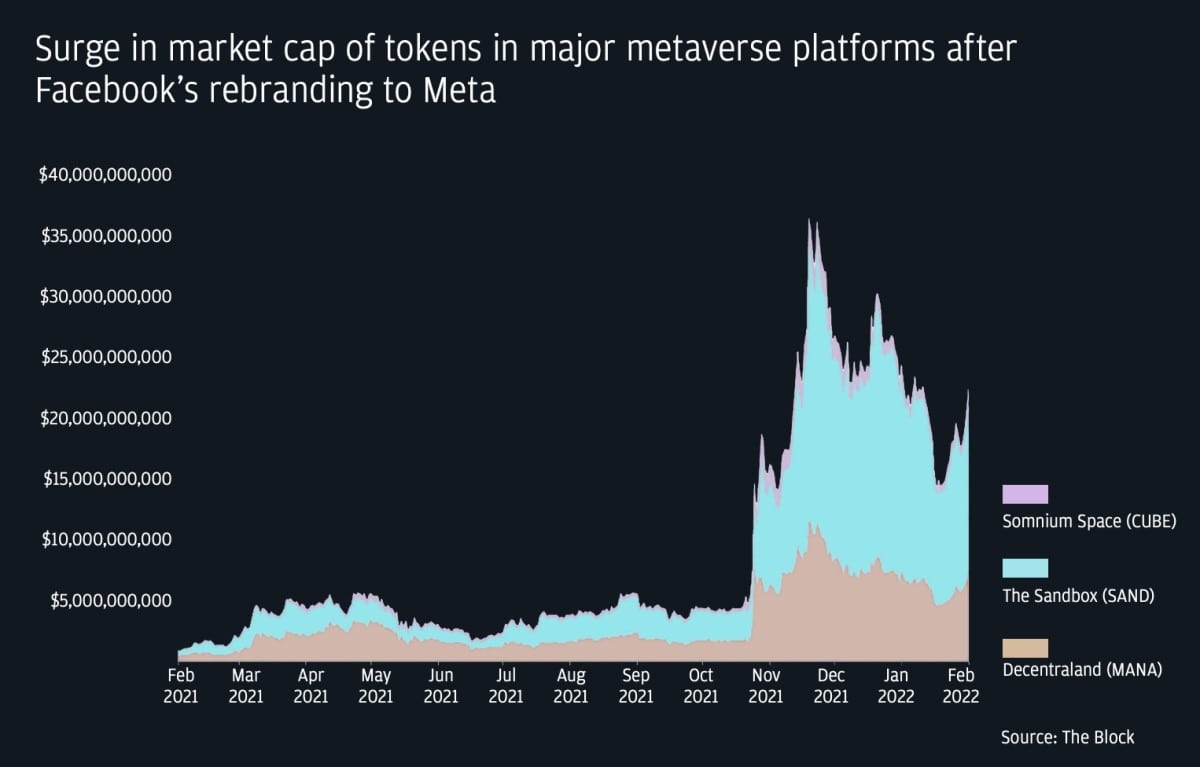
Let's look at five of the highest cap meta-coins (as of March 2022):
Decentraland (MANA)
- Market cap: $4.53 billion
- Price: $2.45
- Industry: 3D virtual world
- Initial release: February 2020
The MANA token was launched by the nonprofit Decentraland Foundation on the Ethereum blockchain. The ecosystem the token exists in offers multiple spaces to create content, explore worlds, and trade in cryptocurrency. But what drove the most attention to the platform was the ability to buy virtual plots of land. The smallest plots sold for $10,000 and $15,000. One asset even went up to $2.4 million in November 2021.
The Sandbox (SAND)
- Market cap: $3.65 billion
- Price: $3.19
- Industry: Mobile gaming
- Initial release: 2011
The Sandbox allows players to build, own and monetise their gaming experiences on the Ethereum blockchain. In the most recent round of investments, The Sandbox raised $93 million in funding. The Japanese tech giant Softbank was one of the biggest investors. The game also signed more than 50 partnerships (Atari, CryptoKitties, The Walking Dead and even Snoop Dogg).
ApeCoin (APE)
- Market cap: $3.49 billion
- Price: $12.34
- Industry: Culture, gaming, and commerce
- Initial release: April 2021
ApeCoin is a governance and utility token for an NFT project of Yuga Labs, BAYC, which published 10,000 unique bored ape artworks. The token was airdropped to all its investors and NFT collectors, including the Bored Ape Kennel Club and the Mutant Ape Yacht Club. The project is based on the idea that web-based content (digital artwork, music, videos, GIFs, in-game items, etc.) should belong to creators.
Axie Infinity (AXS)
- Market cap: $3.17 billion
- Price: $51.91
- Industry: Online gaming
- Initial release: September 2021
The Axie Infinity token powers a blockchain-based game where players can battle, collect and build digital kingdoms for their pets. The game rewards users who reach an advanced level of skill.
Theta Network (THETA)
- Market cap: $3.16 billion
- Price: $3.14
- Industry: Streaming and online advertising
- Initial release: March 2019
Theta Network is an ecosystem of entertainment-focused services, most of which are centred on esports, music, TV, movies, education and corporate conferencing. The token is used as an incentive mechanism for decentralised bandwidth and content sharing.
Conclusion
The Metaverse is at the stage of heavy development, specifically, the fully integrated, fully-featured version of it. Some world-known projects, creators and games, in addition to as well as smaller ones, are already producing content for the Metaverse platforms. The focus is directed at everything from gaming to virtual offices.
In the last couple of years, the term has become a buzzword, and the query "Metaverse explained" skyrocketed, garnering quite a lot of criticism in terms of feasibility, privacy and problematic use of social media. These demonstrate that technology is not neutral. However, at its core, the Metaverse is just a technological and social concept, representing the development progress of various related technologies for public purposes.
Many people believe the Metaverse will launch a new era. This could potentially seamlessly blend our virtual lives with our physical realities. The tech industry still needs to listen to experts warning that it may be a fad and/or carry risks.
FAQ
Does the Metaverse exist?
The first demonstrations of the Metaverse exist in online game universes: Fortnite, Minecraft and Roblox. However, going by the Metaverse definition, it came into existence with Web 2.0, at least as an early version. Now, with an AR/VR overlay, the space is becoming more immersive, three-dimensional, and interoperable.
What is the use of Metaverse?
The Metaverse has progressed in several distinct industries, such as:
- Gaming - "a global living room for millions of gamers"
- Social interaction - connect, collaborate, and communicate digitally without experiencing physical separation
- Media and entertainment - virtual concerts, virtual theme parks, bets on sport
- Virtual tourism - 360° tours around real places in the real world and virtually constructed locations
- Commerce - the blend of virtual (tours, 3D objects) and physical (real-life deliveries) experiences.
What is the Metaverse? What are NFTs?
Although NFTs and the Metaverse have their own separate use cases, they exist in the same decentralised virtual environment.
The Metaverse (Meta verse) is a humongous concept, and NFTs can widen its scope. For example, people are already using NFTs to buy plots of virtual land, event passes with credentials and unique perks, avatars, accessories and other digital items.
Is the Metaverse a cryptocurrency?
No, but there are ties between the two concepts. Cryptocurrencies are used as means of payment in the Metaverse. Just like cryptocurrencies are used to handle transactions relevant to physical environments, these digital assets have the same use — a medium of exchange and a store of value — in virtual environments.
Is the Metaverse built on the blockchain?
Not necessarily. The Metaverse does present a potential opportunity for blockchain-based assets, and the ownership of NFTs is established on the blockchain. It bears mentioning that Web 3.0, which operates through decentralised protocols, the founding blocks of blockchain, will be the foundation for the Metaverse.
Disclaimer: The information in this article is not intended to be and does not constitute investment advice or any other form of advice or recommendation of any sort offered or endorsed by Libertex. Past performance does not guarantee future results.
Why trade with Libertex?
- Get access to a free demo account free of charge.
- Enjoy technical support from an operator 5 days a week, from 9 a.m. to 9 p.m. (Central European Standard Time).
- Use a multiplier of up to 1:30 (for retail clients).
- Operate on a platform for any device: Libertex and MetaTrader.